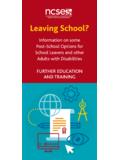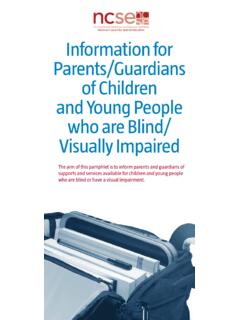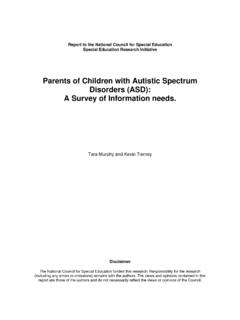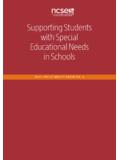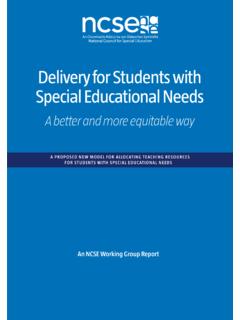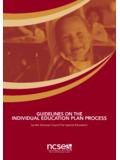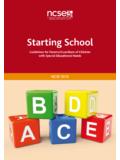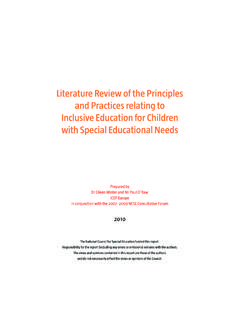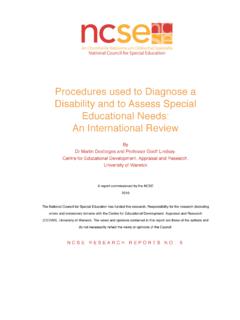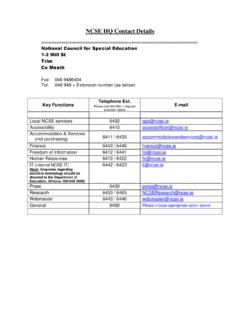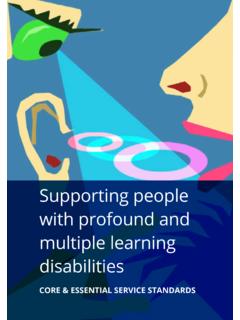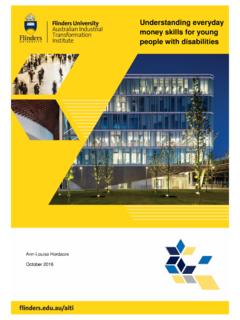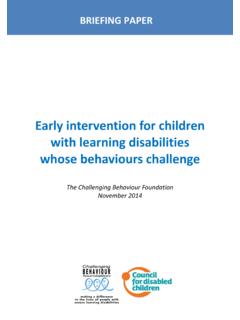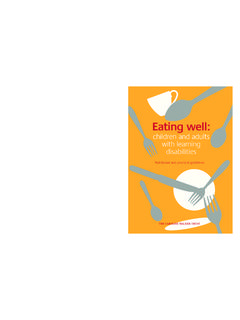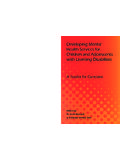Transcription of Information for Parents and Guardians of Children …
1 Information for Parents / Guardians of Children and young people with specific learning disabilities (including dyslexia, dyscalculia, dysgraphia)The aim of this pamphlet is to inform Parents and Guardians of supports and services available for Children and young people with specific learning disabilities and their is a specific learning Disability (SLD)?Sometimes Children have difficulty in a particular area of learning such as reading, writing, spelling and arithmetic. A child may be assessed as having a specific learning disability when their difficulties are very specific and are not due to other causes, such as their general ability being below average, sight or hearing difficulties, emotional factors or a physical condition. Difficulties can range from mild to severe.
2 specific learning disabilities include: Dyslexia which is a difficulty in learning to read. Children may find it hard to learn to read words or to understand what is written. Dyscalculia which is a difficulty with numbers. Children may find it hard to learn to count or add, subtract, multiply and divide or to understand how numbers work. Dysgraphia which is a difficulty with writing or spelling. Children may find it hard to write legibly and may have problems with spelling. They may find it hard to put their thoughts in order when writing a story or essay. How do I find out if my child has a specific learning disability (SLD)?In most cases, a specific learning disability is not formally diagnosed until after a child starts school, although some of the indicators can be present at a pre-school bear in mind that some difficulties can be part of the typical developmental cycle for all Children .
3 It is very normal for a young child to confuse letters or write them backwards at the start. Your child s teacher may be the first professional to notice that there may be an underlying difficulty. A psychological assessment is required for a formal diagnosis of SLD. But you might seek further advice if at: 3-5 years: Your child is later than most Children in learning to speak 5-7 years: Your child has difficulty separating words into sounds, and blending sounds to form words 7-9 years: Your child s reading achievement is below expectation 12+ years: Your child has difficulty planning, sequencing and organising written textA list of such indicators is available on the website of the Special Education Support Service (SESS) see Useful Contacts below for contact nowadays often use the Internet as a source of Information .
4 Please bear in mind that sometimes Information on the internet can be exaggerated, misleading or wrong. In matters concerning your child s health and education, you should seek Information and advice from the appropriate professional sources. The Early DaysThe most important action that you can take, as a parent, is to encourage your child and recognise his/her achievements and successes. From the very beginning it is important to read with your child and to talk about what you are reading. Early access to the spoken and written word is very important for Children s development and will help later when they come to learn about reading, writing and numbers in school. Getting SupportIf you suspect that your child is finding it difficult to learn to read, write or work with numbers, you should seek support as soon as possible as difficulties in these areas can affect a child s self-esteem.
5 If your child is at school, you may wish to raise your concerns with your child s teacher or school principal. The school may be able to support you and/or reassure you about your child s learning . If needed, your child s teacher/school will develop a plan with you to support your child s learning and of NeedParents of any child born after 1st June 2002 may apply to the HSE for an Assessment of Need under the Disability Act, if they think that their child may have a disability. If your child has more complex learning or developmental needs, such a general learning disability (See NCSE parental Information leaflet on general learning disabilities , available on the NCSE website), you can apply to the HSE for an Assessment of Need. Following the assessment, Parents receive an Assessment Report stating their child s needs and the services required to meet those needs.
6 More Information about the Assessment of Need is available on the HSE website at: child may have a specific learning disability but it is important for you to know that many Children with SLD lead happy and fulfilling lives. They receive support in school and many achieve good outcomes and go on to further and higher education. Your Child s EducationDepartment of Education and Skills: PolicyThe Department s policy is focused on ensuring that all Children , including those with specific learning disabilities can have access to an education appropriate to meeting their needs and abilities. The policy is to provide for Children with special educational needs, to be included in mainstream schools unless such a placement would not be in their best interests or the interests of the Children with whom they are to be educated.
7 Some Children with more complex special educational needs may be supported in a special class in a mainstream school. These Children have the option, where appropriate, of full or part-time inclusion and interaction with other Children . Other Children may have such complex needs that they are best placed in a special and Post Primary SchoolThe vast majority of Children with specific learning disabilities attend their local mainstream primary and post-primary schools, with support, as necessary. The education system supports Children and young people with specific learning disabilities in the following ways: The classroom teacher supports students with special educational needs and may adapt lessons or tasks to suit the individual, as necessary. learning support teachers are available to provide additional teaching, if it is required.
8 Additional supports, such as assistive technology (in accordance with the criteria set out in DES Circular 0010/2013) may also be provided where Children are eligible. Information about DES schemes is available on the DES website at: Reasonable Accommodation in Certificate Examinations (RACE) may be available for students with permanent or long-term conditions, including specific learning disabilities , that will significantly impair their performance in the examinations. For more Information , see the website of the State Examinations Commission at: Exemption from the study of Irish may be granted. Further Information is available on the DES website at who require more intensive educational interventions may attend a special school or special class for students with specific learning disabilities , where available.
9 Children attend for one to two years only and then return to their own school. The usual criterion for admission to a special reading school/class is average/above average intelligence, and a significant discrepancy between a student s intellectual ability and literacy levels. The student should have completed 2nd class or be at least 8 years old and not more than 12 years Educational Needs Organisers (SENOs)SENOs provide Information directly to the Parents of Children / young people with special educational needs and to schools. SENOs approve additional teaching and SNA supports to schools, where necessary, to support students with special educational needs. SENOs also have a role in supporting and advising SENO can assist you in a number of ways by: Providing support and advice Identifying possible school placements Liaising with the school, the HSE and other services Assisting in planning the transition of Children to school, between schools and onwards from Educational Psychological Service (NEPS) NEPS psychologists work with Parents , teachers and Children to help all Children develop to their potential.
10 In some individual cases teachers and Parents will agree to seek support from the NEPS psychologist to address difficulties which are affecting the pupil s learning in school. A parent leaflet about the NEPS service is available on the DES website at: InformationFurther Information for Parents / Guardians can be found in the NCSE publications: Children with Special Educational Needs: Information Booklet for Parents Choosing a School: A Guide for Parents and Guardians of Children and young people with Special Educational Needs Post-School Education and Training Information on Options for Adults and School Leavers with DisabilitiesThese publications are available at ContactsYour local SENO may be contacted through the school or from the NCSE website at of Education and Skills: health centre: following websites and support organisations may also be of assistance to you:Dyslexia Association of Ireland.
